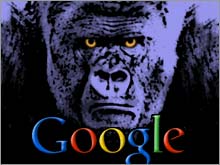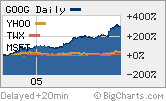 |
 |
| Google's search party: It's easy to see why Microsoft, Time Warner and Yahoo! would be jealious of Google's success. |
|
|
|
|
|
|
|
|
|
NEW YORK (CNNMoney.com) � It's tough to figure out which physics clich� best describes Google. Is it more like an irresistible force or the immovable object?
Either way, Google is without a doubt the preeminent power in the white-hot area of online advertising.
So it should come as no surprise that the topic of Google (Research) was on many people's minds when key Internet executives met at the SG Cowen & Co. Internet Conference in New York on Thursday.
Google is the market share leader in the search engine world but rivals are hoping to eat into its lead.
What's next for AOL?
In fact, there has been speculation that Time Warner's (Research) AOL unit and Microsoft's (Research) MSN are set to announce an alliance where AOL would use MSN's search engine. AOL currently uses Google's search technology.
According to reports, AOL and MSN would also possibly set up a venture to jointly sell online advertising on AOL's Web sites as well as the MSN site. (CNNMoney.com is a division of Time Warner.) AOL is also said to be having talks with Google but a Google deal is not as likely as one with MSN.
Chatter about an announcement being imminent heated up on Thursday. A vice president from AOL was supposed to make a presentation at the SG Cowen conference but had to cancel at the last minute due to a "corporate priority." A representative from MSN did attend, but would not comment on the speculation.
Time Warner chairman and CEO Dick Parsons, speaking at the Credit Suisse First Boston Media Week conference in Boston on Thursday, confirmed that AOL was speaking with other companies about a possible deal that would help increase traffic at AOL's site as well as give it more robust search technology. Parsons also reiterated that Time Warner is not looking to sell AOL.
And others speaking at the SG Cowen conference had opinions about what an AOL-MSN partnership could mean to Google. Bill Wise, the CEO of privately held online advertising firm Did-It Search Marketing, said that an AOL-MSN combination would "immediately level the playing field" in online search.
If AOL were to switch from using Google to MSN's revamped search engine, that could have an impact on Google's growth since AOL accounted for 10 percent of Google's revenues in the third quarter of this year, according to Google's latest quarterly filing with the Securities and Exchange Commission.
Still, the loss of AOL may not have a huge impact on Google, according to another executive speaking at the SG Cowen conference.
"AOL moving to MSN would have an effect, but Google is not a one-trick pony," said Gregg Stewart, a senior vice president with Fathom Online, another privately held online advertising firm. He added that the only way Google could really stumble is if it did something that hurt its brand image.
So far, that doesn't appear to be a problem for Google. According to a recent survey by marketing firm Genius Insight, New York? Google was found to be the 10th most powerful brand name among consumers aged 13 to 49. Google also was found to be one of the best performing brands in a study done for FORTUNE magazine.
But one venture capitalist speaking at the conference said that Google could face a backlash from some of its corporate customers, media companies that use Google's network in order to publish contextual-based ads on their Web sites.
"Publishers are increasingly nervous about Google," said Deven Parekh, managing director with Insight Venture Partners, which invests in several online advertising and commerce companies. "Google is perceived as being interested in the global domination of everything."
Can MSN or others topple Google and Yahoo?
MSN's group product manager Doug Stotland made the point that the search business is still growing rapidly enough for several large players to benefit, saying that he expected MSN to do well even if Google and Yahoo! (Research) continue to thrive. He added that increased competition from MSN as well as other players such as IAC/InterActive's (Research) Ask Jeeves search engine should be good for the industry since more competition should also lead to more innovation.
To that end, Stotland touted MSN's adCenter, a program that the company is currently testing. According to Stotland, adCenter will allow advertisers to bid for keyword searches based on specific customer data such as age, gender and geographic location. MSN has access to such data through products such as Hotmail and MSN Messenger.
But even the threat from MSN might not be enough to derail Google's growth.
Bob Davis, a partner with venture capital firm Highland Capital Partners and the former CEO of Web portal Lycos, said at the SG Cowen conference that he doesn't think MSN or any other media company with aspirations of building their own search engine has a chance of catching Google or Yahoo!
"The game is over and it is won. It will be a Google-Yahoo! story for years to come," said Davis, adding that there may be some opportunities for niche online advertising firms in the short term but that eventually many of these niche firms will wind up either being acquired or put out of business by Google and Yahoo!
Gerry Horkan, the head of business development for Yahoo!, said at the conference that he felt Yahoo! was in a strong position to compete with Google and MSN, which currently is still a partner of Yahoo! He added at the conference that one thing that Yahoo! has to offer which can differentiate it from other search engines like Google is a community-like element, something he referred to as "social search."
As an example, he said that by using Yahoo's My Web feature, a user could search for say, sushi restaurants in their neighborhood and receive links to reviews by users in addition to links to pages for the individual restaurants. Google is also testing a so-called personalized search tool, however.
And one executive at the SG Cowen conference said the only thing that could stop Google is Google itself.
"If they don't make a big dumb acquisition they will be in good shape," said Mike Yavonditte, CEO of privately held search marketing firm Quigo. "All they need to do is keep inventing new products. They have a very long run ahead of them."
The reporter of this story owns shares of Time Warner through his company's 401(k) plan.
Sign up to receive the Tech Investor column by e-mail.
Plus, see more tech commentary and get the latest tech news.

|